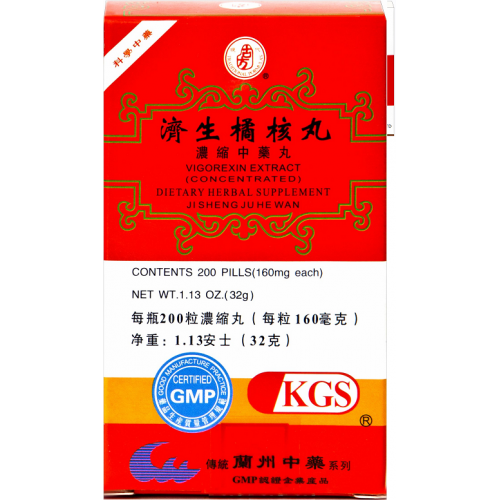
Ju He Wan 橘核丸 - Tangerine Seed Formula
Citrus Aurantium Pills
| Generally used for |
|
| Formula Actions |
|
| TCM DX |
|
JU HE WAN Ingredients
|
Botanical Name
|
Pin Yin Name
|
% |
| Sm. Citri Reticulatae | Ju He | 10 |
| Fr. Toosendan | Chuan Lian Zi | 10 |
| Rx. Aucklandiae | Mu Xiang | 10 |
| Sm. Persicae | Tao Ren | 10 |
| Rz. Corydalis | Yan Hu Suo | 10 |
| Cx. Cinnamomi | Rou Gui | 5 |
| Caulis Akebiae | Mu Tong | 5 |
| Cx. Magnoliae Officinalis | Hou Po | 5 |
| Fr. Aurantii Immaturus | Zhi Shi | 5 |
| Seaweed | Hai Zao | 15 |
| Kelp | Kun Bu | 15 |
Safety and Side Effects of JU HE WAN
- Do not use for soft scrotal or other swellings.
- If the swellings have ulcerated, use appropriate topical applications in addition.
Pregnant and nursing women should consult their healthcare provider before using any supplement.
Most formulas are prescribed according to a TCM diagnosis and are designed for use by practitioners. If you are not a practitioner, self-prescribing is emphatically not recommended. To insure the best outcome, and to minimize any chance of side effects, we urge you to click here and Start an E-mail Consultation.
JU HE WAN Dosage and Administration
Granules: 2-4 grams, taken 2-3 times a day, best on an empty stomach
Capsules: 3-4 capsules, 3 times a day, or as prescribed
Whole Herbs: Using a container made of ceramic, glass, or stainless steel (no aluminum, iron or copper) boil 1 packet (50 grams) of herbs in 2-3 quarts of water for until 2 cups of medicine remain. Strain herbs; save and refrigerate for a second boiling. Drink 1 cup in the AM. And 1 cup in the PM. If desired, repeat the following day, using the saved herbs from the refrigerator.
Commonly, Chinese herbs are boiled for 20 - 40 minutes, the dregs are strained out and the "tea" is taken warm or at room temperature. Boiling times are averaged according to the composition of the formula. Flower and leaf will yield medicine in 5 -20 minutes. Roots take 20 to 40 minutes; Shells and minerals must cook for at least one hour. A few herbs, like mint or tangerine peel, must be quick-boiled for only 1-5 minutes to retain their volatile oils. These herbs are added separately to the boiling mixture just before completion.
Topical Application: for patients with ulcerations of the scrotum, apply this formula topically.
Tips on Taking Chinese Medicine & Drinking Chinese Herbal Decoctions
"If bad taste means strong medicine, you're cured. " Some people enjoy drinking herbal blends, but for many of us, effective doses of medicinal herbs taste bad. To make matters worse, cooking herbs can befoul your kitchen (if not your whole house). However using a little common sense can make this a lot easier.
First, while cooking herbs, ventilate the kitchen. This stops the odor from deterring you (and your family). If you find the taste of your medicine disagreeable, hold your nose when you drink your herbs. This eliminates almost all the taste. Drink your herbs lukewarm or at room temperature. Hot liquids must be sipped slowly. If you hate the taste, you'll want to drink it down quickly. Cold liquids have less taste but may be hard to digest.After drinking your medicine, chew a few raisins or place a drop of lemon juice on your tongue to eliminate any aftertaste.
Herbs can be absorbed up to 30% better when taken on an empty stomach. Allow at least a half hour after taking herbs before eating or taking additional medicines. There are some exceptions. If your medicine proves difficult to digest, try taking it with food or after eating. Some doctors believe that formulas designed for the upper body should be taken after eating. Some medicines are best taken with other liquids such as wine (injuries or vascular problems), broth (to aid digestion of the herbs), or salt water (messenger to the Kidneys).
* What’s the Difference Between, PIAN, WAN, TANG, SAN, SHUI and GAO?
- PIAN = Tablet (modern looking pill)
- WAN = Pill (old-style or handmade pill, or black teapill)
- TANG = Water Decoction (boiled whole herbs)
- SAN = Powder (milled or granulated)
- SHUI = Tincture (extract with alcohol or other solvent)
- GAO = Paste (topical unguent or plaster)
Traditional Chinese Medicine is powerful and reliable, but it can be complex. As TCM is not based on symptoms alone, self-diagnosis and self-treatment aren't recommended. Best to start a low cost online-herbal-consultation.
** These statements have not been evaluated by the US Food and Drug Administration. These products are not intended to diagnose, treat, cure or prevent any disease. Pregnant or nursing women should consult their health care provider before taking any supplement.




